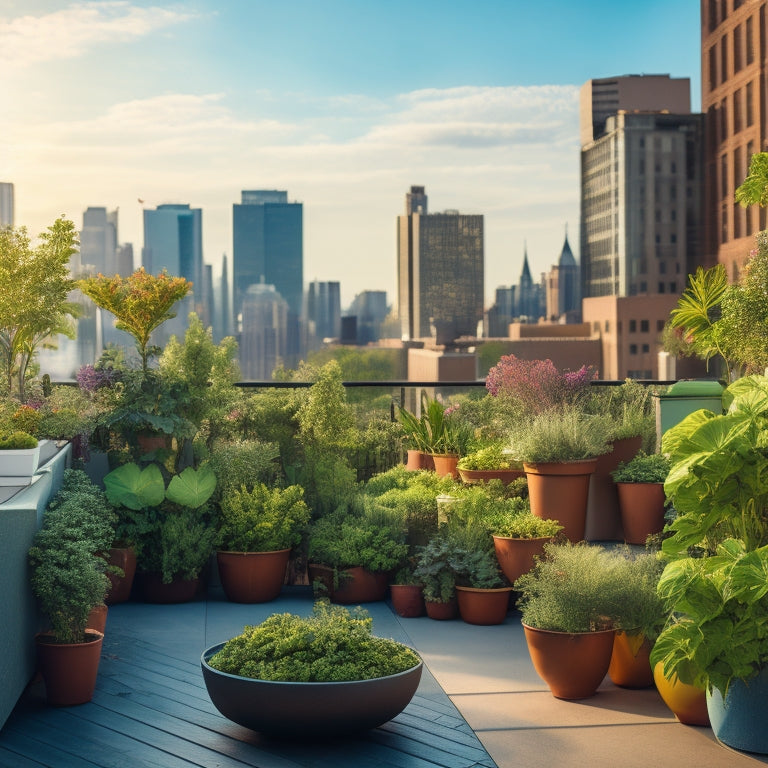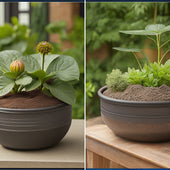
What You Need for a Rooftop Hydroponic Garden
Share
To set up a thriving rooftop hydroponic garden, you'll need a reliable hydroponic system with a reservoir, pump, and irrigation system to deliver nutrient-rich solutions to plant roots. Verify your rooftop space can support the weight and maintenance requirements of the system, and consider environmental factors like wind and snow loads. You'll also need to maintain ideal growing conditions, including a balanced nutrient solution, perfect temperature and lighting ranges, and a well-designed irrigation system. By carefully considering these essential factors, you'll be well on your way to cultivating a thriving rooftop garden, and there's much more to explore in the world of hydroponic gardening.
Key Takeaways
• Evaluate rooftop space and weight capacity to ensure a safe and stable hydroponic garden setup.
• Select a suitable hydroponic system, including a reservoir, pump, and irrigation system, for efficient plant feeding.
• Choose a balanced nutrient solution with essential macronutrients and micronutrients, and monitor pH levels for optimal plant growth.
• Consider climate control and lighting needs, including temperature ranges and customizable light spectra, for different plant growth stages.
• Plan for regular maintenance, including cleaning and testing, to prevent system failures and ensure a healthy harvest.
Essential Hydroponic System Components
Your rooftop hydroponic garden relies on several critical components working in harmony to deliver a bountiful harvest, including a reservoir, pump, and irrigation system. The reservoir stores the nutrient-rich solution that feeds your plants, while the pump circulates the solution through the irrigation system, which in turn delivers it to the roots of your plants.
You'll also need to choose a suitable growing media option, such as rockwool, coco coir, or clay pebbles, which will support the roots of your plants and provide a stable environment for growth.
To guarantee your system runs smoothly, it's crucial to perform regular system maintenance. Check the pH and nutrient levels of your solution regularly, and top up or adjust as needed. Clean your pump and irrigation system regularly to prevent clogging and bacterial growth.
Additionally, monitor your plants' progress and adjust your system's settings accordingly. By following these system maintenance tips, you'll be able to identify and address any issues before they affect your harvest.
With these essential components and regular maintenance, you'll be well on your way to enjoying a thriving rooftop hydroponic garden.
Rooftop Garden Space Considerations
When designing your rooftop hydroponic garden, consider the available space and weight capacity of your roof to determine the best garden size and layout.
You'll need to evaluate the space accessibility, guaranteeing there's enough room for your plants, hydroponic system, and maintenance access. Measure the rooftop's dimensions, taking into account any obstructions like vents, skylights, or chimneys.
Structural stability is also vital. Confirm your roof can support the weight of the hydroponic system, plants, and water. You may need to consult with a structural engineer or contractor to determine the maximum weight capacity.
Don't forget to factor in wind loads, snow loads, and other environmental factors that may impact your rooftop garden.
Once you've determined the available space and weight capacity, you can plan your garden's layout. Consider a vertical or tiered design to maximize space, or use space-saving hydroponic systems like NFT or DWC.
Hydroponic Nutrient Solution Needs
To guarantee ideal plant growth, you'll need a hydroponic nutrient solution that provides a balanced mix of macronutrients, micronutrients, and pH adjusters tailored to your specific crop's requirements. A well-balanced nutrient solution guarantees that your plants receive the necessary elements for maximum growth.
Macronutrients like nitrogen, phosphorus, and potassium are essential for plant development, while micronutrients like iron, zinc, and boron play a vital role in plant metabolism. Achieving the right nutrient balance is critical, as excess or deficiency of any nutrient can hinder plant growth.
You'll need to monitor and adjust the solution pH, which should fall within a specific range for your crop. For example, most vegetables thrive in a pH range of 5.5 to 6.5. Regularly test the solution pH and make adjustments as necessary to guarantee maximum nutrient uptake.
Climate Control and Lighting Needs
Optimizing your rooftop hydroponic garden's climate and lighting conditions is essential, as plants respond differently to various temperature, humidity, and light spectra, which can greatly impact their growth and productivity.
You'll need to take into account temperature regulation, making certain that your plants receive the ideal temperature range for their specific growth stage. For instance, seedlings and young plants thrive in temperatures between 65-75°F (18-24°C), while mature plants can tolerate slightly warmer temperatures.
Lighting is another critical factor, as different light spectra can influence plant growth and development. You'll need to select a lighting system that provides the suitable light spectrum for your plants. For example, blue-dominant light spectra promote vegetative growth, while red-dominant spectra enhance flowering and fruiting.
LED grow lights are a popular choice, as they offer energy efficiency and customizable spectra. Make sure to position your lighting system correctly to guarantee uniform coverage and avoid hotspots.
Water Pump and Irrigation System
By installing a reliable water pump and irrigation system, you'll be able to deliver the precise amount of nutrient-rich solution to your plants' roots, ensuring they receive the necessary sustenance for ideal growth.
A well-designed irrigation system will distribute the solution evenly, preventing overwatering and underwatering. Consider a pump with adjustable flow rates to accommodate different plant sizes and growth stages. Regular pump maintenance is essential to prevent clogs, corrosion, and mechanical failure. Check the pump's filters and impellers regularly and perform routine cleaning to maintain peak performance.
To enhance irrigation efficiency, consider using a drip irrigation system, which delivers the solution directly to the roots, reducing evaporation and runoff.
You can also implement a timer to automate watering schedules, ensuring your plants receive the right amount of water at the right time.
Frequently Asked Questions
Can I Grow Root Vegetables in a Rooftop Hydroponic Garden?
"Can you imagine growing crunchy carrots on your rooftop? You can, but it'll require choosing root vegetable varieties suitable for hydroponic root systems, which can be more compact and shallow than traditional soil-based systems."
How Often Should I Clean My Rooftop Hydroponic System?
You'll want to establish a regular cleaning schedule for your rooftop hydroponic system to prevent clogs and guarantee peak performance. Follow these maintenance tips: clean pumps and filters weekly, and inspect tubes and reservoirs bi-weekly.
Will Rooftop Hydroponic Gardens Attract Pests and Rodents?
As you cultivate a lush oasis amidst the urban jungle, you'll want to guarantee it doesn't become a haven for unwanted critters. You'll need to implement pest prevention and rodent control measures to safeguard your rooftop hydroponic haven from unwanted visitors.
Can I Use Rainwater in My Rooftop Hydroponic System?
You can use rainwater in your rooftop hydroponic system, but first, you'll need to implement a proper rainwater filtration process to remove contaminants, ensuring the water is safe for your plants and won't disrupt hydroponic nutrient uptake.
Are Rooftop Hydroponic Gardens More Susceptible to Wind Damage?
You're not going to get blown away by the news: rooftop hydroponic gardens are more susceptible to wind damage, but don't worry, you can mitigate this with wind resistance strategies and robust structural support to guarantee your system stays intact.
Related Posts
-

10 Best Shade Garden Planters Using Concrete Blocks
You're about to discover the perfect way to add industrial chic to your shade garden while ensuring healthy plant gro...
-

10 Best Shade Garden Planters Using Concrete Blocks
You're about to discover the perfect way to add industrial chic to your shade garden while ensuring healthy plant gro...
-

10 Best Shade Garden Planters Using Concrete Blocks
You're about to discover the perfect way to add industrial chic to your shade garden while ensuring healthy plant gro...
-

10 Best Shade Garden Planters Using Concrete Blocks
You're about to discover the perfect way to add industrial chic to your shade garden while ensuring healthy plant gro...
-

10 Best Shade Garden Planters Using Concrete Blocks
You're about to discover the perfect way to add industrial chic to your shade garden while ensuring healthy plant gro...
-

10 Best Shade Garden Planters Using Concrete Blocks
You're about to discover the perfect way to add industrial chic to your shade garden while ensuring healthy plant gro...
-

10 Best Shade Garden Planters Using Concrete Blocks
You're about to discover the perfect way to add industrial chic to your shade garden while ensuring healthy plant gro...
-

10 Best Shade Garden Planters Using Concrete Blocks
You're about to discover the perfect way to add industrial chic to your shade garden while ensuring healthy plant gro...
-

10 Best Shade Garden Planters Using Concrete Blocks
You're about to discover the perfect way to add industrial chic to your shade garden while ensuring healthy plant gro...
-

10 Best Shade Garden Planters Using Concrete Blocks
You're about to discover the perfect way to add industrial chic to your shade garden while ensuring healthy plant gro...
-

10 Best Shade Garden Planters Using Concrete Blocks
You're about to discover the perfect way to add industrial chic to your shade garden while ensuring healthy plant gro...
-

10 Best Shade Garden Planters Using Concrete Blocks
You're about to discover the perfect way to add industrial chic to your shade garden while ensuring healthy plant gro...
-

10 Best Shade Garden Planters Using Concrete Blocks
You're about to discover the perfect way to add industrial chic to your shade garden while ensuring healthy plant gro...
-

10 Best Shade Garden Planters Using Concrete Blocks
You're about to discover the perfect way to add industrial chic to your shade garden while ensuring healthy plant gro...
-

10 Best Shade Garden Planters Using Concrete Blocks
You're about to discover the perfect way to add industrial chic to your shade garden while ensuring healthy plant gro...
-

10 Best Shade Garden Planters Using Concrete Blocks
You're about to discover the perfect way to add industrial chic to your shade garden while ensuring healthy plant gro...
-

10 Best Shade Garden Planters Using Concrete Blocks
You're about to discover the perfect way to add industrial chic to your shade garden while ensuring healthy plant gro...
-

10 Best Shade Garden Planters Using Concrete Blocks
You're about to discover the perfect way to add industrial chic to your shade garden while ensuring healthy plant gro...
-

10 Best Shade Garden Planters Using Concrete Blocks
You're about to discover the perfect way to add industrial chic to your shade garden while ensuring healthy plant gro...
-

10 Best Shade Garden Planters Using Concrete Blocks
You're about to discover the perfect way to add industrial chic to your shade garden while ensuring healthy plant gro...
-

10 Best Shade Garden Planters Using Concrete Blocks
You're about to discover the perfect way to add industrial chic to your shade garden while ensuring healthy plant gro...
-

10 Best Shade Garden Planters Using Concrete Blocks
You're about to discover the perfect way to add industrial chic to your shade garden while ensuring healthy plant gro...
-

10 Best Shade Garden Planters Using Concrete Blocks
You're about to discover the perfect way to add industrial chic to your shade garden while ensuring healthy plant gro...
-

10 Best Shade Garden Planters Using Concrete Blocks
You're about to discover the perfect way to add industrial chic to your shade garden while ensuring healthy plant gro...
-

10 Best Shade Garden Planters Using Concrete Blocks
You're about to discover the perfect way to add industrial chic to your shade garden while ensuring healthy plant gro...
-

10 Best Shade Garden Planters Using Concrete Blocks
You're about to discover the perfect way to add industrial chic to your shade garden while ensuring healthy plant gro...
-

10 Best Shade Garden Planters Using Concrete Blocks
You're about to discover the perfect way to add industrial chic to your shade garden while ensuring healthy plant gro...
-

10 Best Shade Garden Planters Using Concrete Blocks
You're about to discover the perfect way to add industrial chic to your shade garden while ensuring healthy plant gro...
-

10 Best Shade Garden Planters Using Concrete Blocks
You're about to discover the perfect way to add industrial chic to your shade garden while ensuring healthy plant gro...
-

10 Best Shade Garden Planters Using Concrete Blocks
You're about to discover the perfect way to add industrial chic to your shade garden while ensuring healthy plant gro...
-

10 Best Shade Garden Planters Using Concrete Blocks
You're about to discover the perfect way to add industrial chic to your shade garden while ensuring healthy plant gro...
-

10 Best Shade Garden Planters Using Concrete Blocks
You're about to discover the perfect way to add industrial chic to your shade garden while ensuring healthy plant gro...
-

10 Best Shade Garden Planters Using Concrete Blocks
You're about to discover the perfect way to add industrial chic to your shade garden while ensuring healthy plant gro...
-

10 Best Shade Garden Planters Using Concrete Blocks
You're about to discover the perfect way to add industrial chic to your shade garden while ensuring healthy plant gro...
-

10 Best Shade Garden Planters Using Concrete Blocks
You're about to discover the perfect way to add industrial chic to your shade garden while ensuring healthy plant gro...
-

What Depth Is Best for My Planter
When selecting a planter, consider the root depth requirements of your chosen plant species, as this dictates the min...
-

What Depth Is Best for My Planter
When selecting a planter, consider the root depth requirements of your chosen plant species, as this dictates the min...
-

What Depth Is Best for My Planter
When selecting a planter, consider the root depth requirements of your chosen plant species, as this dictates the min...
-

What Depth Is Best for My Planter
When selecting a planter, consider the root depth requirements of your chosen plant species, as this dictates the min...
-

What Depth Is Best for My Planter
When selecting a planter, consider the root depth requirements of your chosen plant species, as this dictates the min...
-

What Depth Is Best for My Planter
When selecting a planter, consider the root depth requirements of your chosen plant species, as this dictates the min...
-

What Depth Is Best for My Planter
When selecting a planter, consider the root depth requirements of your chosen plant species, as this dictates the min...
-

What Depth Is Best for My Planter
When selecting a planter, consider the root depth requirements of your chosen plant species, as this dictates the min...
-

What Depth Is Best for My Planter
When selecting a planter, consider the root depth requirements of your chosen plant species, as this dictates the min...
-

What Depth Is Best for My Planter
When selecting a planter, consider the root depth requirements of your chosen plant species, as this dictates the min...
-

What Depth Is Best for My Planter
When selecting a planter, consider the root depth requirements of your chosen plant species, as this dictates the min...
-

What Depth Is Best for My Planter
When selecting a planter, consider the root depth requirements of your chosen plant species, as this dictates the min...
-

What Depth Is Best for My Planter
When selecting a planter, consider the root depth requirements of your chosen plant species, as this dictates the min...
-

What Depth Is Best for My Planter
When selecting a planter, consider the root depth requirements of your chosen plant species, as this dictates the min...
-

What Depth Is Best for My Planter
When selecting a planter, consider the root depth requirements of your chosen plant species, as this dictates the min...
-

What Depth Is Best for My Planter
When selecting a planter, consider the root depth requirements of your chosen plant species, as this dictates the min...
-

What Depth Is Best for My Planter
When selecting a planter, consider the root depth requirements of your chosen plant species, as this dictates the min...
-

What Depth Is Best for My Planter
When selecting a planter, consider the root depth requirements of your chosen plant species, as this dictates the min...
-

What Depth Is Best for My Planter
When selecting a planter, consider the root depth requirements of your chosen plant species, as this dictates the min...
-

What Depth Is Best for My Planter
When selecting a planter, consider the root depth requirements of your chosen plant species, as this dictates the min...
-

What Depth Is Best for My Planter
When selecting a planter, consider the root depth requirements of your chosen plant species, as this dictates the min...
-

Why Invest in Specialized Planter Tools
You'll greatly boost your gardening success and yields by leveraging specialized planter tools that cater to the uniq...
-

Why Invest in Specialized Planter Tools
You'll greatly boost your gardening success and yields by leveraging specialized planter tools that cater to the uniq...
-

Why Invest in Specialized Planter Tools
You'll greatly boost your gardening success and yields by leveraging specialized planter tools that cater to the uniq...
-

Why Invest in Specialized Planter Tools
You'll greatly boost your gardening success and yields by leveraging specialized planter tools that cater to the uniq...
-

Why Invest in Specialized Planter Tools
You'll greatly boost your gardening success and yields by leveraging specialized planter tools that cater to the uniq...
-

Why Invest in Specialized Planter Tools
You'll greatly boost your gardening success and yields by leveraging specialized planter tools that cater to the uniq...
-

Why Invest in Specialized Planter Tools
You'll greatly boost your gardening success and yields by leveraging specialized planter tools that cater to the uniq...
-

Why Invest in Specialized Planter Tools
You'll greatly boost your gardening success and yields by leveraging specialized planter tools that cater to the uniq...
-

Why Invest in Specialized Planter Tools
You'll greatly boost your gardening success and yields by leveraging specialized planter tools that cater to the uniq...
-

Why Invest in Specialized Planter Tools
You'll greatly boost your gardening success and yields by leveraging specialized planter tools that cater to the uniq...
-

Why Invest in Specialized Planter Tools
You'll greatly boost your gardening success and yields by leveraging specialized planter tools that cater to the uniq...
-

Why Invest in Specialized Planter Tools
You'll greatly boost your gardening success and yields by leveraging specialized planter tools that cater to the uniq...
-

Why Invest in Specialized Planter Tools
You'll greatly boost your gardening success and yields by leveraging specialized planter tools that cater to the uniq...
-

Why Invest in Specialized Planter Tools
You'll greatly boost your gardening success and yields by leveraging specialized planter tools that cater to the uniq...
-

Why Invest in Specialized Planter Tools
You'll greatly boost your gardening success and yields by leveraging specialized planter tools that cater to the uniq...
-

Why Invest in Specialized Planter Tools
You'll greatly boost your gardening success and yields by leveraging specialized planter tools that cater to the uniq...
-

Why Invest in Specialized Planter Tools
You'll greatly boost your gardening success and yields by leveraging specialized planter tools that cater to the uniq...
-

Why Invest in Specialized Planter Tools
You'll greatly boost your gardening success and yields by leveraging specialized planter tools that cater to the uniq...
-

Why Invest in Specialized Planter Tools
You'll greatly boost your gardening success and yields by leveraging specialized planter tools that cater to the uniq...
-

Why Invest in Specialized Planter Tools
You'll greatly boost your gardening success and yields by leveraging specialized planter tools that cater to the uniq...
-

Why Invest in Specialized Planter Tools
You'll greatly boost your gardening success and yields by leveraging specialized planter tools that cater to the uniq...
-

Why Invest in Specialized Planter Tools
You'll greatly boost your gardening success and yields by leveraging specialized planter tools that cater to the uniq...
-

Why Invest in Specialized Planter Tools
You'll greatly boost your gardening success and yields by leveraging specialized planter tools that cater to the uniq...
-

Why Invest in Specialized Planter Tools
You'll greatly boost your gardening success and yields by leveraging specialized planter tools that cater to the uniq...
-

Why Invest in Specialized Planter Tools
You'll greatly boost your gardening success and yields by leveraging specialized planter tools that cater to the uniq...


